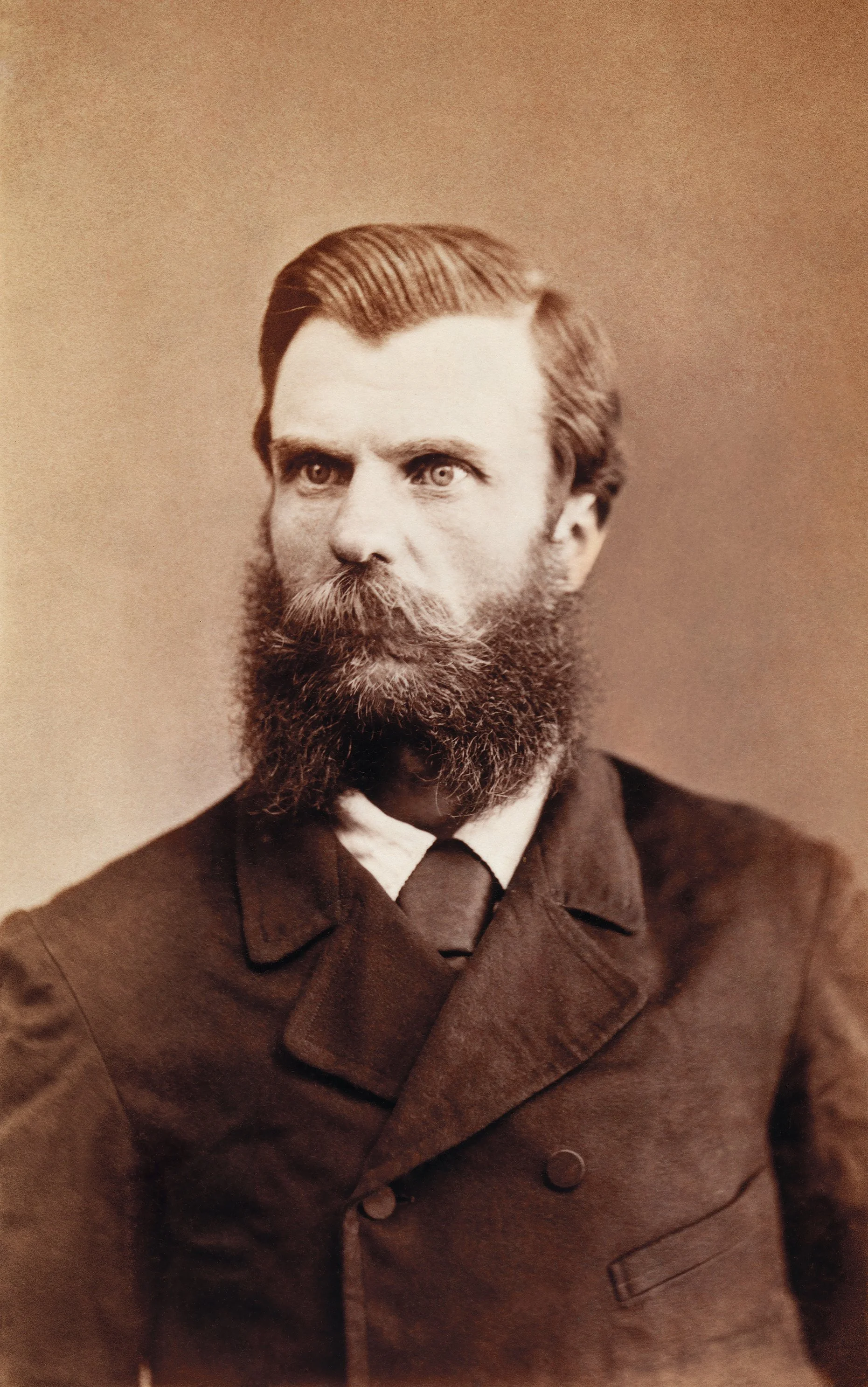S9E10: Tom of Finland
Tom of Finland advertised the concept of gay masculinity to gays becoming men. The influence of his work on gay male sex cultures, on ideals of queer masculinities, and especially on leather scenes remains enormous and contested.
Live from Helsinki, we close out our season with Tom of Finland, the man who advertised the concept of gay masculinity to gays becoming men. Originally his illustrations were controversial because of his graphic depictions of gay sex, of sodomy and cocksucking and fisting in a pre-liberation, pre-internet age. Today, things have changed so much you can buy Tom branded products in department stores like Selfridges, and books of his drawings in Barnes and Noble. But at the same time, his representations of Black men and of Nazi aesthetics have drawn new criticisms, even while the fisting and piss and cock-sucking have become perfect home decorations. And the influence of his work on gay male sex cultures, on ideals of queer masculinities, and especially on leather scenes, remains enormous and contested.
SOURCES:
F. Valentine Hooven III, Tom Of Finland: His Life And Times (St. Martin's, 1992)
Arnie Kantrowitz, Swastika Toys, in Leatherfolk, edited by Mark Thompson, pp. 193–209.
Hunter Scott, “Facing Sameness: Reconsidering the Radicality of Tom of Finland.” InVisible Culture 36, https://doi.org/10.47761/494a02f6.262a8f58
Carta Monir, "Morally Erect," Lux Magazine, https://lux-magazine.com/article/tom-of-finland/
https://worldcrunch.com/in-the-news/tom-of-finland-double-life-of-the-gay-icon-who-changed-a-nation/
https://kunstkritikk.com/the-cult-of-iconified-homosexuality/
Our intro music is Arpeggia Colorix by Yann Terrien, downloaded from WFMU's Free Music Archive and distributed under a Creative Commons Attribution-ShareAlike License. Our outro music is by DJ Michaeloswell Graphicsdesigner.
Image via.
S9E9: William Beckford
A novelist, a member of parliament, a collector of art, antiquities, and books, a travel writer, and a builder of great palaces–and a slave owner, and a pedophile.
William Beckford, who was born not in Bath but in London in 1760, is someone for whom property, in every sense of the word, was the defining factor in his life. He was a novelist, a member of parliament, a collector of art, antiquities, and books, a travel writer, and a builder of great palaces; he regarded himself as a man of culture, but he made his cultural qualities known by buying and building things. And he could afford to buy and build things - ridiculous things - because he was rich, extraordinarily rich, richer than we can possibly imagine. So all his status, his legacy, the thing that made him who he was, came from his wealth, and his wealth came from another form of property he owned: chattel slaves. And that wealth also enabled him to pursue troubling relationships with boys.
SOURCES:
James Lees-Milne, William Beckford (Compton Press, 1976)
J. W. Oliver, The Life of William Beckford (Oxford University Press, 1932)
Guy Chapman, William Beckford (Scribner, 1937)
Caroline Stanford, Beckford’s Tower History Album (National Trust)
A number of essays on Rictor Norton’s website about him including “The Fool at Fonthill” https://www.rictornorton.co.uk/
Our intro music is Arpeggia Colorix by Yann Terrien, downloaded from WFMU's Free Music Archive and distributed under a Creative Commons Attribution-ShareAlike License. Our outro music is by DJ Michaeloswell Graphicsdesigner.
S9E8: E. M. Forster
Live from Sheffield DocFest, it's E. M. Forster: who in his 91 years of life was one of Britain’s most successful novelists. He was raised in a climate of Victorian propriety so extreme he went to university without understanding human reproduction, and then fell in with a secret society known for alternative thinking and "aggressive" homosexuality. Italy — and later India — represented paradises of freedom and liberation in comparison to the cramped, horrid Edwardian upper middle classes. Erotic contact with the working-class/brown Other was the waters of Lourdes for this uptight Englishman, who was never able to transcend his own position.
Live from Sheffield DocFest, it's E. M. Forster: who in his 91 years of life was one of Britain’s most successful novelists. He was raised in a climate of Victorian propriety so extreme he went to university without understanding human reproduction, and then fell in with a secret society known for alternative thinking and "aggressive" homosexuality. Italy — and later India — represented paradises of freedom and liberation in comparison to the cramped, horrid Edwardian upper middle classes. Erotic contact with the working-class/brown Other was the waters of Lourdes for this uptight Englishman, who was never able to transcend his own position.
SOURCES
Wendy Moffat, E. M. Forster: A New Life (Bloomsbury, 2010).
https://www.varsity.co.uk/features/25279
http://www.glbtqarchive.com/ssh/cambridge_apostles_S.pdf
https://www.nybooks.com/articles/2014/11/06/forster-love-story/
https://www.newyorker.com/magazine/2009/03/23/man-with-a-past
https://www.theguardian.com/books/2012/feb/17/e-m-forster-my-policeman
https://www.lrb.co.uk/the-paper/v35/n01/alan-hollinghurst/poor-dear-how-she-figures
https://www.nytimes.com/2010/07/25/books/review/Toibin-t.html
Our intro music is Arpeggia Colorix by Yann Terrien, downloaded from WFMU's Free Music Archive and distributed under a Creative Commons Attribution-ShareAlike License. Our outro music is by DJ Michaeloswell Graphicsdesigner.
S9E7: Captain Moonlite
Another episode down under: Andrew George Scott is best remembered to history as the enigmatic “Captain Moonlite”, and the story of his short but eventful life is a fascinating tale of personal conscience, colonialism, and criminality. Born in Ireland, he was taken by his family to New Zealand, became a military man, attempted to become a priest, robbed a bank, toured as an inspirational speaker, held up a sheep station, and requested to be buried in the arms of his lover.
Another episode down under: Andrew George Scott is best remembered to history as the enigmatic “Captain Moonlite”, and the story of his short but eventful life is a fascinating tale of personal conscience, colonialism, and criminality. Born in Ireland, he was taken by his family to New Zealand, became a military man, attempted to become a priest, robbed a bank, toured as an inspirational speaker, held up a sheep station, and requested to be buried in the arms of his lover.
SOURCES:
Paul Terry, In Search of Captain Moonlite: Bushranger, Conman, Warrior, Lunatic (Allen & Unwin, 2013)
Stephan Williams, The Wantabadgery Bushrangers: A Partial Study (Popinjay Publications, 1991)
https://www.themonthly.com.au/november-2015/essays/queer-bushranger
Our intro music is Arpeggia Colorix by Yann Terrien, downloaded from WFMU's Free Music Archive and distributed under a Creative Commons Attribution-ShareAlike License. Our outro music is by DJ Michaeloswell Graphicsdesigner.
S9E6: Tracey Wigginton
The place: Queensland, Australia; a state just recovering from decades of rule by "hillbilly dictator" Joh Bjelke-Petersen, a petty authoritarian with a reputation for brutal homophobia and the even more brutal repression of street protest. The time: the late Eighties, at the height of the AIDS epidemic and public fear about queers and blood. The woman: Tracey Wigginton, a deeply disturbed woman from an abusive background who committed a horrifying crime. The media saw a potential scandal, and created one: it was easier to believe lesbians are vampires than to believe in the endemic nature of family abuse and violence in our society.
The place: Queensland, Australia; a state just recovering from decades of rule by "hillbilly dictator" Joh Bjelke-Petersen, a petty authoritarian with a reputation for brutal homophobia and the even more brutal repression of street protest. The time: the late Eighties, at the height of the AIDS epidemic and public fear about queers and blood. The woman: Tracey Wigginton, a deeply disturbed woman from an abusive background who committed a horrifying crime. The media saw a potential scandal, and created one: it was easier to believe lesbians are vampires than to believe in the endemic nature of family abuse and violence in our society.
SOURCES:
https://www.couriermail.com.au/news/paroled-lesbian-vampire-killer-tracey-wigginton-will-get-away-with-lies/news-story/d7f1890bf3cb800c110a63d9afae6573
https://www.9news.com.au/national/queensland-news-vampire-killer-tracey-wigginton-facebook-posts/09282693-2a38-4a28-b774-e4e13ce75528
Wiggington, Tracey. "A perspective on long term imprisonment." Hecate, vol. 28, no. 1, May 2002, pp. 163+. Gale Literature Resource Center, link.gale.com/apps/doc/A90137673/LitRC?u=fub&sid=summon&xid=a75e4729. Accessed 6 Aug. 2025.
https://www.couriermail.com.au/news/paroled-lesbian-vampire-killer-tracey-wigginton-will-get-away-with-lies/news-story/d7f1890bf3cb800c110a63d9afae6573
https://www.news.com.au/lifestyle/real-life/true-stories/lesbian-vampire-killer-who-drank-victims-blood/news-story/09102844937bc5d7f8ae57a6ecaa7d23
https://www.couriermail.com.au/news/queensland/crime-and-justice/the-dark-secrets-of-queenslands-lesbian-vampire-killer/news-story/f06485d6f4bedf7aff10c6d0cc0493de
Our intro music is Arpeggia Colorix by Yann Terrien, downloaded from WFMU's Free Music Archive and distributed under a Creative Commons Attribution-ShareAlike License. Our outro music is by DJ Michaeloswell Graphicsdesigner.
S9E5: Angela Calomiris
Behind Angie’s role as a local doyenne, she trailed a dark secret about her life as a young photographer in New York. How did Angela end up in Provincetown, and why was the mere sight of her name enough to induce horror in a fellow photographer?
Today we’re discussing a strange and compelling figure, the photographer Angela Calomiris. We can start at the end of her life, as a denizen of Provincetown, the little resort at the tip of Cape Cod in Massachusetts that has long been a haven for LGBTQ people. Angie had a reputation as a formidable figure in the town as a tough, and not always fair, businesswoman. She had made good money through some stiff deals. But she was also regarded as generous, if eccentric, by others. Yet behind Angie’s role as a local doyenne, she trailed a dark secret about her life as a young photographer in New York. How did Angela end up in Provincetown, and why was the mere sight of her name enough to induce horror in a fellow photographer? In today’s episode, we’ll discuss Angela’s life of FBI collaboration, naming names, secrets and lies.
SOURCES:
Lisa Davis, Undercover girl : the lesbian informant who helped the FBI bring down the Communist Party (Imagine, 2017)
Lisa Davis, The Spy Who Came in from the Closet https://glreview.org/article/the-spy-who-came-in-from-the-closet/
David K. Johnson, The Lavender Scare (Chicago University Press, 2004)
Mason Klein, The radical camera : New York's Photo League, 1936-1951 (Yale University Press, 2011)
Carol A. Stabile, The Broadcast 4: Women and the Anti- Communist Blacklist (Goldsmith's Press, 2018)
Sophia Starmack, The rise and fall and P’town rebirth of Angela Calomiris https://eu.wickedlocal.com/story/provincetown-banner/2017/05/18/the-rise-fall-p-x2019/4502034007/
Veronica A. Wilson ‘I chose the values I regarded as American’: Sexuality, ethnicity, and FBI informant Angela Calomiris https://www.ingentaconnect.com/contentone/lwish/tcc/2021/00000020/00000020/art00005
Our intro music is Arpeggia Colorix by Yann Terrien. Our outro music is by DJ Michaeloswell Graphicdesigner. This podcast may contain copyrighted material, and its use is under the principles of fair use for purposes such as commentary, criticism, and parody. All rights belong to the respective copyright holders.
S9E4: Jacob Israël de Haan
Today's subject, Jacob Israël de Haan, wrote one of the first gay Dutch novels. Born in 1881 in the Netherlands, he was assassinated by the Haganah paramilitary at the age of 42 in Palestine, having moved there to establish Zion, and then having turned on the Zionist project because of its treatment of the Arabs. His love of young Arab men was both a source of scandal and a very troubling source of evolving solidarity.
Today's subject, Jacob Israël de Haan, wrote one of the first gay dutch novels. "What is it that I long for," he asked. "The sanctity of Israel or an Arab male prostitute?" Born in 1881 in the Netherlands, he was assassinated by the Haganah paramilitary at the age of 42 in Palestine, having moved there to establish Zion, and then having turned on the Zionist project because of its treatment of the Arabs. His love of young Arab men was both a source of scandal and a very troubling source of evolving solidarity.
SOURCES:
https://archive.ph/wkF8y#selection-1069.0-1074.0
http://www.corpse.org/archives/issue_5/critical_urgencies/giebels.htm
https://www.gerthekma.nl/ewExternalFiles/Jacob Israël de Haan. Pederast poet between Amsterdam and Jerusalem.pdf
https://rabbidunner.com/assassination-in-the-holy-city/#_edn12
https://glreview.org/article/article-964/
https://www.the-low-countries.com/wp-content/uploads/2024/08/TLC_24_Chronicle_WASSING_NASSAU.pdf
https://www.the-low-countries.com/wp-content/uploads/2024/08/TLC_24_Chronicle_WASSING_NASSAU.pdf
https://www.tabletmag.com/sections/arts-letters/articles/jacob-de-haan-political-poet
https://glreview.org/article/article-964/
https://library.oapen.org/bitstream/id/c9843d1e-4703-45eb-a317-4de724d686a1/The multiple lives of Jacob Israel de Haan.pdf
https://www.palestine-studies.org/sites/default/files/jq-articles/Jacob Israel de Haan - A Queer and Lapsed Zionist in Mandate Palestine.pdf
S9E3: Charles Hitchen
A man who got rich playing both sides of a pay to play criminal justice system while touring through London's infamous "molly houses," back rooms of taverns or gin houses where queer men could meet and cruise.
Let us take ourselves back to a very exciting time: we’re talking London, at the turn of the 18th century. The city is the largest in Europe, and growing - it’s passed the half a million mark and by the end of the century will have doubled. Crime was rife, and getting worse. The law was administered by a pay-to-play criminal justice system: and today's subject, Charles Hitchen, got rich playing both sides while touring through London's infamous "molly houses," back rooms of taverns or gin houses, where queer men could meet, cruise, and even fuck. These developed a much richer culture, with their own slang, faux marriage rituals, and drag performances including a queen giving birth to a wheel of cheddar cheese.
SOURCES:
Gerald Howson, Thief-Taker General: Jonathan Wild and the Emergence of Crime and Corruption as a Way of Life in Eighteenth-Century England (Routledge, 1985)
Peter Linebaugh, The London Hanged: Crime And Civil Society In The Eighteenth Century (Verso, 2006)
Rictor Norton, The Georgian Underworld, https://rictornorton.co.uk/gu00.htm.
Our intro music is Arpeggia Colorix by Yann Terrien. Our outro music is by DJ Michaeloswell Graphicdesigner. This podcast may contain copyrighted material, and its use is under the principles of fair use for purposes such as commentary, criticism, and parody. All rights belong to the respective copyright holders.
S9E2: Dorian Corey
Many people in our audience will have seen Jennie Livingston’s 1990 documentary Paris Is Burning, an exploration of Black and Latinx ball culture in New York City. One of the film’s primary interview interlocutors is Dorian Corey, who is one of the film’s most quotable characters. Corey's life helps us explore the history of drag from balls for enslaved people in the 1870s to today. And did you know that Corey knew, during all those serene interviews in Paris Is Burning, that the man she had murdered in self-defense and not trusted police to handle it (would you?) was mummified in the closet behind her.
Many people in our audience will have seen Jennie Livingston’s 1990 documentary Paris Is Burning, an exploration of Black and Latinx ball culture in New York City. One of the film’s primary interview interlocutors is Dorian Corey, who is one of the film’s most quotable characters. Corey's life helps us explore the history of drag from balls for enslaved people in the 1870s to today. And did you know that Corey knew, during all those serene interviews in Paris Is Burning, that the man she had murdered in self-defense and not trusted police to handle it (would you?) was mummified in the closet behind her.
SOURCES:
https://archive.seattletimes.com/archive/19931218/1737662/deceased-drag-show-star-leaves-mummy-mystery-behind-in-closet
https://www.theguardian.com/film/2015/jun/24/burning-down-the-house-debate-paris-is-burning
https://files.eportfolios.macaulay.cuny.edu/wp-content/uploads/sites/5381/2016/06/16101213/hooks_paris-is-burning.pdf
https://www.nytimes.com/1993/04/18/style/paris-has-burned.html
https://www.swervmagazine.com/entertainment-2/pioneers/
https://queermusicheritage.com/drag-pearl.html
https://www.chicagomag.com/Chicago-Magazine/November-2005/The-Gay-30S/
https://www.thenation.com/article/society/drag-queen-slave-ball/
https://www.harlemworldmagazine.com/the-legendary-hamilton-lodge-ball-home-at-the-rockland-palace-dance-hall-in-harlem/
https://americanhistory.si.edu/explore/stories/queens-and-queers-rise-drag-ball-culture-1920s
https://www.jstor.org/stable/2935316?seq=1
https://www.theguardian.com/film/2015/jun/24/burning-down-the-house-debate-paris-is-burning
https://zagria.blogspot.com/2010/08/dorian-corey-1937-1993-performer.html
Our intro music is Arpeggia Colorix by Yann Terrien. Our outro music is by DJ Michaeloswell Graphicdesigner.
S9E1: Little Richard
Little Richard, inventor of rock’n’roll, contained multitudes: a pioneering rock and roll musician who stunned audiences with his fast-paced hits in a quite macho rock world, a huge influence on musicians from Elvis and The Beatles to James Brown, Prince, Patti Smith, Andre 3000, and more, a Seventh Day Adventist preacher from the deep south of the United States who preached about sin, and a drag performer under the name Princess LaVonne.
Today's episode is about three very different men and how their lives overlapped. The first was a pioneering rock and roll musician who stunned audiences with his fast-paced hits in a quite macho rock world: a huge influence on musicians from Elvis and The Beatles to James Brown, Prince, Patti Smith, Andre 3000, and more. It was a very eclectic mix and he lived an equally fast-paced private life off stage. The second man was a Seventh Day Adventist preacher from the deep south of the United States who preached about sin. The third person was a young Black queer man thrown out of his home by his domineering pastor father in the late 1940s who became a drag performer under the name Princess LaVonne, performing in clubs and for traveling medicine shows and dressing in capes and turbans, singing obscene songs about anal sex while cruising bathrooms for sexual contacts with men. These were all one and the same man: Richard Wayne Penniman, better known by his performing name, Little Richard.
SOURCES
Abdurraqib, Hanif. "What Little Richard Deserved." The New Yorker. https://www.newyorker.com/culture/culture-desk/what-little-richard-deserved
Freeman, Scott. "Remembrance: How Little Richard Invented Rock'n'roll in Macon, Georgia." ArtsAtlanta. https://www.artsatl.org/remembrance-how-little-richard-invented-rock-n-roll-in-macon-georgia/
Little Richard: I Am Everything. HBO, dir. Lisa Cortes
Little Richard, Live in Paris, 1966: https://www.youtube.com/watch?v=t7TWclEcASU&themeRefresh=1
Nyong'o, Tavia. "Too Black, Too Queer, Too Holy." The Guardian https://www.theguardian.com/music/2020/may/12/too-black-queer-holy-why-little-richard-never-truly-got-his-dues-turbaned-drag-queen-sexual-underworld
Smith, Jami. "The Drag Queens Who Helped Little Richard Invent Rock And Roll." https://www.songsthatsavedyou.com/p/drag-queens-who-helped-little-richard
White, Charles. The Life and Times of Little Richard: The Quasar of Rock (Da Capo Press, 1994)
Our intro music is Arpeggia Colorix by Yann Terrien. Our outro music is by DJ Michaeloswell Graphicdesigner. This podcast may contain copyrighted material, and its use is under the principles of fair use for purposes such as commentary, criticism, and parody. All rights belong to the respective copyright holders.
Special Episode: Coil
We welcome music writer Hannah Pezzack to talk about the experimental electronic band Coil.
Today, we welcome music writer Hannah Pezzack to talk about the experimental electronica band Coil – namely, its two frontmen and only consistent members: vocalist Geoff Rushton, who performed under the stage name John Balance, and Peter Christopherson, nicknamed “Sleazy." At the heart of it all was an intense interest in the occult: in magic, alchemy, and esoteric symbolism. But just as central was their homosexuality: a queerness expressed through sexualised violence, the taboo, bodily fluids — blood, sweat, and scat — and an obsession with self-annihilation.
Subscribe to EXTRA BAD GAYS on Patreon or Apple Podcasts to join the community of subscribing members who make episodes like this possible, and get our monthly chat show about gay culture and politics!
SOURCES:
Hayes Hampton. The Invocation of the Black Sun: Alchemy and Sexuality in the Work of Coil, in Folk Horror Revival: Harvest Hymns Volume I – Twisted Roots (Durham, UK: Wyrd Harvest Press, 2018)
David Keenan. England's Hidden Reverse: A Secret History of the Esoteric Underground, Revised and Expanded Edition (London: Strange Attractor Press, 2023; originally published 2003)
Cormac Pentecost. Man is the Animal, zine issues 1–4, (Temporal Boundary Press)
Genesis P‑Orridge. Nonbinary (New York: Abrams Press, 2022)
Nick Soulsby. Everything Keeps Dissolving: Conversations with Coil (London: Strange Attractor Press, 2023)
Spencer Sunshine. Neo-Nazi Terrorism and Countercultural Fascism: The Origins and Afterlife of James Mason’s Siege (London: Routledge, 2024)
Cosey Fanni Tutti. Art Sex Music (London: Faber and Faber, 2017)
“AN INTERVIEW WITH COIL (Harvest History Month Pt. I),” conducted by Malahki Thorn, Heathen Harvest (originally published 1 April 2004),https://4ibrecords.com/2014/03/05/an-interview-with-coil-harvest-history-month-pt-i/
Hannah Pezzack on Instagram: https://www.instagram.com/hanapezzack/?hl=en
Hannah Pezzack on SoundCloud: https://soundcloud.com/hannah-pezzack
Many thanks to Alina Valentina and Ruben Verkuylen for their invaluable technical assistance.
Gratitude to Elina Tapio (who first introduced me to Coil!) and Marco Segato – both part of eoobe – for keeping the spirit of John and Sleazy alive through their music: https://eoobe.bandcamp.com/
Our intro music is Arpeggia Colorix by Yann Terrien. Our outro music is by DJ Michaeloswell Graphicdesigner.
Special Episode: Gavin Arthur
Have you ever wondered who the sexual link between Edward Carpenter and Allen Ginsburg was? Wonder no more, and meet Gavin Arthur: grandson of US President Chester Allan Arthur, astrologer, sexologist, Irish Republican, sometime Communist, sometime Democrat, Haight-Ashbury hippie rabble-rouser, and chaotic bisexual. Our guide to his life is longtime friend of the show Maurice J. Casey, historian and author of Hotel Lux: An Intimate History of Communism's Forgotten Radicals.
Have you ever wondered who the sexual link between Edward Carpenter and Allen Ginsburg was? Wonder no more, and meet Gavin Arthur: grandson of US President Chester Allan Arthur, astrologer, sexologist, Irish Republican, sometime Communist, sometime Democrat, Haight-Ashbury hippie rabble-rouser, and chaotic bisexual. Our guide to his life is longtime friend of the show Maurice J. Casey, historian and author of Hotel Lux: An Intimate History of Communism's Forgotten Radicals. This episode is based on research carried out as part of the Queer Norther Ireland: Sexuality before Liberation project at Queen's University Belfast and Ulster University. If you have a moment, do fill out their survey.
Join our community of Extra Bad Gays on Patreon or Apple Podcasts for special episodes and more!
SOURCES:
Maurice J. Casey, ‘”I want to be to Ireland what Walt Whitman was to America”: Esotericism and Queer Sexuality in an Irish Social Circle, 1890s-1920s’, History Workshop Journal: https://academic.oup.com/hwj/advance-article/doi/10.1093/hwj/dbaf004/8096618?searchresult=1
Lisa Cohen, All We Know: Three Lives, New York, 2012
Philip Longo, ‘Between the Sheets: Gavin Arthur’s Sexual Circulation’, in The Routledge Handbook of Queer Rhetoric, ed. Jacqueline Rhodes and Jonathan Alexander, London, 2022, pp. 140–7
Martin Murray, ‘Walt Whitman, Edward Carpenter, Gavin Arthur and the Circle of Sex’, Walt Whitman Quarterly 22: 3, 2005, pp. 194–8: https://whitmanarchive.org/criticism/wwqr/pdf/anc.00943.pdf
The 1930 film starring Gavin Arthur and Charlotte Arthur: https://en.wikipedia.org/wiki/Borderline_(1930_film)
Our intro music is Arpeggia Colorix by Yann Terrien. Our outro music is by DJ Michaeloswell Graphicdesigner.
Special Episode: Alexander von Humboldt
German naturalist Alexander von Humboldt travelled the world amassing a wealth of botanical, geological, and human knowledge. His very private - and homosexual - life is still shrouded in mystery and historiographic embarrassment.
Today we welcome Michael Huldt, host of Worm From Home, an environmental history podcast focused on East London, to discuss the German naturalist Alexander von Humboldt. Born in Berlin in 1769, he would travel the world amassing a wealth of botanical, geological, and human knowledge. Working in Europe, Russia, and South America, Humboldt became a pioneer of Western environmental thinking, breaking with contemporary scientific norms to forge an interconnected, ecological view of the world that still resonates today. His life was one of illuminating contradictions, and he is a fascinating figure for thinking about the creation of new concepts of 'Nature' as racial capitalism was in its ascendancy - a vocal anti-slavery advocate, who was personal friends with Thomas Jefferson; an early European proponent of the idea that colonial extraction created massive environment destruction, who also forged a career through that colonial infrastructure; and a man with many famous friends whose very private - and homosexual - private life is still shrouded in mystery and historiographic embarrassment.
SOURCES:
https://www.andreawulf.com/about-the-invention-of-nature.html
https://www.smithsonianmag.com/history/pioneering-maps-alexander-von-humboldt-180973342/
https://www.antarcticglaciers.org/antarctica-2/people-in-antarctica/alexander-von-humboldt/
https://qnews.com.au/on-this-day-january-6-von-humboldt-tainted-love/
Our intro music is Arpeggia Colorix by Yann Terrien. Our outro music is by DJ Michaeloswell Graphicdesigner.
S8E10: Jacques de Molay
Today’s subject, Jacques de Molay, was the last Grand Master of the Knights Templar/ Ever since their dissolution, the Knights Templar have been associated with all sorts of occult manifestations. Today we’re going to steer away from these fantastical theories, because the reality of the Templars is far more interesting.
Today’s subject, Jacques de Molay, was the last Grand Master of the Knights Templar, or to give them their full title, the Poor Fellow-Soldiers of Christ and of the Temple of Solomon. Ever since their dissolution, the Knights Templar have been associated with all sorts of apparent manifestations - of occultism, of shadowy transnational powerbrokers, as the Guardians of the Holy Grail or whatnot. Today we’re going to steer away from these fantastical theories, because the reality of the Templars is far more interesting.
SOURCES:
Michael Barber, A New Knighthood: A History of the Order of the Temple (Cambridge: Cambridge University Press, 1993)
Dan Jones, Crusaders: The Epic History of the Wars for the Holy Land (New York: Viking, 2019)
Dan Jones, The Templars: The Rise and Spectacular Fall of God's Holy Warriors (New York: Viking, 2007)
Amin Maalouf, The Crusades through Arab Eyes (New York: Schocken Books, 1984)
Our intro music is Arpeggia Colorix, by Yann Terrien. Our outro music is by DJ Michaeloswell Graphicdesigner. Image via.
S8E9: Adele Spitzeder
Adele Spitzeder, born into operatic royalty, washed up when she tried a career on the stage: so instead, she started accepting bank deposits for 10% monthly interest, and paying old customers with new customers' money. In three years, she amassed deposits of 38 million Gulden, or the equivalent of more than 500,000,000 euros: the world’s first Ponzi scheme. Attempts to squirrel away some money by smuggling it with her girlfriend went about as well as expected.
Adele Spitzeder, born into operatic royalty, washed up when she tried a career on the stage: so instead, she started accepting bank deposits for 10% monthly interest, and paying old customers with new customers' money. In three years, she amassed deposits of 38 million Gulden, or the equivalent of more than 500,000,000 euros: the world’s first Ponzi scheme. Attempts to squirrel away some money by smuggling it with her girlfriend went about as well as expected.
SOURCES:
“Adele Spitzeder.” Accessed February 18, 2025. https://www.literaturportal-bayern.de/themen?task=lpbtheme.default&id=697.
“Betty Vio – Biographische Informationen aus der WeGA.” Accessed February 18, 2025. https://weber-gesamtausgabe.de/de/A008536.html.
“‘Die Zehn Gebote Der Adele Spitzeder’, Bild 1 von 14 | MDZ.” Accessed February 18, 2025. https://www.digitale-sammlungen.de/de/view/bsb10999593?q=%28adele+spitzeder%29&page=1.
“Digitale Bibliothek - Münchener Digitalisierungszentrum.” Accessed February 18, 2025. https://daten.digitale-sammlungen.de/0006/bsb00067974/images/index.html?fip=193.174.98.30&id=00067974&seite=1000.
Dokumentation, Österreichisches Biographisches Lexikon und biographische. “Spitzeder, (Johann) Josef.” Text. ISBN 978-3-7001-3213-4. Verlag der Österreichischen Akademie der Wissenschaften, 2003. https://www.biographien.ac.at/oebl/oebl_S/Spitzeder_Josef_1794_1832.xml.
Freiberger, Harald. “Geld - Adele Spitzeder und ihr Schneeballsystem.” Süddeutsche.de, November 11, 2017. https://www.sueddeutsche.de/muenchen/schneeballsystem-es-begann-in-der-au-1.3743735.
“Germany - Metternich, Unification, 1815-71 | Britannica,” February 18, 2025. https://www.britannica.com/place/Germany/The-age-of-Metternich-and-the-era-of-unification-1815-71.
Schumann, Dirk. “Der Fall Adele Spitzeder 1872: Eine Studie Zur Mentalität Der ‘Kleinen Leute’ in Der Grübderzeut.” Zeitschrift Für Bayerische Landesgeschichte 58, no. 2/3 (1995): 991–1025.
Spitzeder, Adele. Geschichte meines Lebens. Stuttgarter Verlagscomptoir, 1878.
Zeno. “Lexikoneintrag zu »Spitzeder-Vio, Betty«. Damen Conversations Lexikon, Band 9. [o.O.] ...” Accessed February 18, 2025. http://www.zeno.org/DamenConvLex-1834/A/Spitzeder-Vio,+Betty.
Our intro music is Arpeggia Colorix by Yann Terrien. Our outro music is by DJ Michaeloswell Graphicdesigner. Image via.
S8E8: Anne Lister
She was an industrialist, a lesbian, a landlord, a traveler, a businesswoman, a womanizer, a butch, a snob, a pioneer of gay marriage, a Tory. She was the original Tory girlboss, and19th century English diarist who coined such terms as "grubbling," for mutual masturbation. Ey up love, been grubbling?
She was an industrialist, a lesbian, a landlord, a traveler, a businesswoman, a womanizer, a butch, a snob, a pioneer of gay marriage, a Tory. She was the original Tory girlboss, and19th century English diarist who coined such terms as "grubbling," for mutual masturbation. Ey up love, been grubbling? She was, of course, Anne Lister.
SOURCES:
Caroline Gonda and Chris Roulston, eds., Decoding Anne Lister: From the Archives to ‘Gentleman Jack’ (Cambridge, United Kingdom New York, NY: Cambridge University Press, 2025)
Jill Liddington, Female Fortune: The Anne Lister Diaries, 1833–36: Land, Gender and Authority: New Edition(Manchester University Press, 2022)
H. Whitbread, I Know My Own Heart: The Diaries of Anne Lister, 1791-1840 (New York: New York University Press, 1992)
“Packed With Potential,” https://www.packedwithpotential.org/.
Our intro music is Arpeggia Colorix by Yann Terrien. Our outro music is by DJ Michaeloswell Graphicdesigner. Image via.
S8E7: Larry Kramer
Today we profile Larry Kramer, the writer and AIDS activist. We address Kramer as one of his narrators addressed his stand-in in the first volume of his last novel, The American People: “You fuckster! You are so fucksome. I love you very much.”’
Today we profile Larry Kramer, the writer and AIDS activist. Kramer took space, took credit, operated in the world with tremendous privilege, and was somewhere between actively and passively misogynist and racist. But politically effective people are not always as we imagine them. We document Kramer's exclusions and blind spots, and explore how his hatred and fear of gay male sex culture, one that predated the AIDS epidemic, made his political work less effective; his gay male supremacism that led actual gay men to constantly disappoint him; and his prefiguring of a moralizing social media politics understanding rhetorical maximalism as the proof of radicality. We address Kramer as one of his narrators addressed his stand-in in the first volume of his last novel, The American People: “You fuckster! You are so fucksome. I love you very much.”
SOURCES:
Larry Kramer, Faggots, reprint edition (New York: Grove Press, 2000)
Larry Kramer, “March 27, 1983: 1,112 and Counting,” Los Angeles Blade: LGBTQ News, Rights, Politics, Entertainment(blog), May 27, 2020, https://www.losangelesblade.com/2020/05/27/march-27-1983-1112-and-counting/
Larry Kramer, TheNormal Heart and The Destiny of Me: Two Plays (New York: Grove Press, 2000)
Ben Miller, “Larry Kramer’s Great Expectations,” Literary Hub (blog), June 11, 2020, https://lithub.com/larry-kramers-great-expectations/
Sarah Schulman, Let the Record Show: A Political History of ACT UP New York, 1987-1993 (New York: Farrar, Straus & Giroux Inc, 2021)
Michael Shnayerson, “Kramer vs. Kramer | Vanity Fair,” Vanity Fair | The Complete Archive, accessed February 4, 2025, https://archive.vanityfair.com/article/1992/10/kramer-vs-kramer
“Larry Kramer’s Anger Is Essential in Historic ‘Plague’ Speech,” accessed February 4, 2025, https://www.advocate.com/news/2020/5/27/larry-kramers-anger-essential-historic-plague-speech
Jane McAlevey on How To Organize for Power,” Current Affairs, April 20, 2019, https://www.currentaffairs.org/news/2019/04/jane-mcalevey-on-how-to-organize-for-power.
Our intro music is Arpeggia Colorix by Yann Terrien. Our outro music is by DJ Michaeloswell Graphicdesigner.
S8E6: Abd Al-Ilah
The Crown Prince of Iraq, Abd Al-Ilah, ruled the country as a prince regent on behalf of his nephew, from 1939-1953 - although not interrupted. A member of the powerful Hashemite dynasty, Al-Ilah was also an authoritarian antisemite who once took refuge on a British naval ship called the HMS Cockchafer. A dandy, he charmed MP Chips Cannon into writing: "We are very intimate …I never can resist a Regent.”
The Crown Prince of Iraq, Abd Al-Ilah, ruled the country as a prince regent on behalf of his nephew, from 1939-1953 - although not interrupted. A member of the powerful Hashemite dynasty, Al-Ilah was also an authoritarian antisemite who once took refuge on a British naval ship called the HMS Cockchafer. A dandy, he charmed MP Chips Cannon into writing: "We are very intimate …I never can resist a Regent.”
SOURCES:
Bloch, Michael. Closet Queens: Some 20th Century British Politicians. London: Little, Brown UK, 2016.
Channon, Chips. Henry ‘Chips’ Channon: The Diaries (Volume 3): 1943-57. Penguin, 2025.
Cole, Juan. “Iraq and the Israeli-Palestinian Conflict in the Twentieth Century” 23 (n.d.).
Draper, Morris. Interview by Charles Stuart Kennedy, February 27, 1991. https://adst.org/OH%20TOCs/Draper,%20Morris.toc.pdf.
Finnie, David. Shifting Lines in the Sand: Kuwait’s Elusive Frontier with Iraq. London: I.B. Tauris, 1992.
Hashimoto, Chikara. The Twilight of the British Empire: British Intelligence and Counter-Subversion in the Middle East, 1948–63. Edinburgh University Press, 2017.
Mansfield, Peter, and Nicolas Pelham. A History of the Middle East: Fifth Edition. Updated edition. New York/N.Y: Penguin Books, 2013.
Schwartz, Adi. “The Adas Affair.” Tablet Magazine, December 9, 2022. https://www.tabletmag.com/sections/history/articles/adas-affair-jews-iraq.
Our intro music is Arpeggia Colorix by Yann Terrien. Our outro music is by DJ Michaeloswell Graphicdesigner.
S8E5: Reed Erickson
An eccentric, wealthy businessman–with the pet tiger, Mexican nudist ashram, ketamine and cocaine habits, and baroque legal battles to prove it–who also financially supported trans research, gay history, and dolphin ESP, Reed Erickson forged his own path in a difficult world.
Today's episode profiles an eccentric, wealthy businessman––with the pet tiger, Mexican nudist ashram, ketamine and cocaine habits, and baroque legal battles over the title to various compounds to prove it––who also financially supported trans research, gay history, and dolphin ESP. Reed Erickson forged his own path in a difficult world and his life helps us understand two connections that were crucial for the developing gay and trans liberation movements of the 1960s and 1970s: sexology and the New Age.
Today's episode of our podcast was recorded before the 2024 United States Presidental election. Given yesterday's executive orders, discussion of the anti-trans backlash and fighting transphobia are more important than ever. Today, please consider contacting Trans Lifeline if you need support, or donating if you are able.
SOURCES:
One From The Vaults, on Reed Erickson: https://soundcloud.com/onefromthevaultspodcast/oftv-5-the-trans-howard-hughes
Making Gay History, on Reed Erickson: https://makinggayhistory.org/podcast/reed-erickson/
Bello, Ada. “Reed Erickson, Pioneering Transgender Activist and Philanthropist, 1917-1992.” Outhistory. Accessed January 20, 2025. https://outhistory.org/exhibits/show/erickson/essay.
Devor, Aaron, and Nicholas Matte. “Building a Better World for Transpeople: Reed Erickson and the Erickson Educational Foundation.” International Journal of Transgenderism 10, no. 1 (October 12, 2007): 47–68. https://doi.org/10.1300/J485v10n01_07.
Devor, Aaron, and Nicholas Matte. “ONE Inc. and Reed Erickson: The Uneasy Collaboration of Gay and Trans Activism, 1964-2003.” GLQ: A Journal of Lesbian and Gay Studies 10, no. 2 (2004): 179–209.
Gill-Peterson, Jules. A Short History of Trans Misogyny. London: Verso, 2024.
Gill-Peterson, Jules. Histories of the Transgender Child. Minneapolis: University of Minnesota Press, 2018.
Lewis, Abram J. “I Am 64 and Paul McCartney Doesn’t Care: The Haunting of the Transgender Archive and the Challenges of Queer History." Radical History Review 120 (Fall 2014), 13-34.
Nunn, Zavier. “Trans Liminality and the Nazi State.” Past & Present 260, no. 1 (August 2023): 123–57. https://doi.org/10.1093/pastj/gtac018.
S8E4: Albrecht Muth
Albrecht Muth claimed to be a dashing German aristocrat and married into Washington's foreign policy elite. The shocking truth became one of official Washington's biggest mysteries...
For today’s episode, I we take you into the murky world of the Washington foreign policy elites, and one of its murkiest characters, a man named Albrecht Muth. Who is Albrecht Muth? Well, that’s another question entirely. He claimed to be a dashing German aristocrat and married into Washington's foreign policy elite. The shocking truth became one of official Washington's biggest mysteries...
SOURCES:
Alexander, Keith L. “Albrecht Muth, 49, Convicted of Murder in Death of Socialite Wife Viola Drath, 91.” Washington Post, January 16, 2014. https://www.washingtonpost.com/local/crime/muth-found-guilty-of-murder-in-death-of-socialite-wife/2014/01/16/5a942d9e-7ecd-11e3-93c1-0e888170b723_story.html.
Foer, Franklin. “The Worst Marriage in Georgetown.” The New York Times, July 6, 2012, sec. Magazine. https://www.nytimes.com/2012/07/08/magazine/albrecht-muth-and-viola-drath-georgetowns-worst-marriage.html.
Meredith Somers. “Drath Murder Case Exposes Bizarre Lifestyle of Georgetown Couple.” The Washington Times. Accessed January 13, 2025. https://www.washingtontimes.com/news/2012/apr/24/drath-murder-case-exposes-bizarre-lifestyle-of-geo/
Martin, Adam. “The Odd Behavior of a Husband Arrested for a D.C. Socialite’s Murder.” The Atlantic (blog), August 17, 2011. https://www.theatlantic.com/national/archive/2011/08/unfortunate-behavior-husband-arrested-dc-socialites-murder/354256/.
The Daily Beast. “Inside D.C.’s Socialite Murder,” September 8, 2011. https://www.thedailybeast.com/socialite-murder-viola-drath-and-albrecht-muths-tumultuous-marriage/.
Washington City Paper. “Viola Drath’s Cultural Legacy: A Look at the Works of a Murdered D.C. Writer,” August 25, 2011. http://washingtoncitypaper.com/article/423666/viola-draths-cultural-legacy-a-look-at-the-works-of-a-murdered-d-c-writer/.
Our intro music is Arpeggia Colorix by Yann Terrien. Our outro music is by DJ Michaeloswell Graphicdesigner. Image via.






















